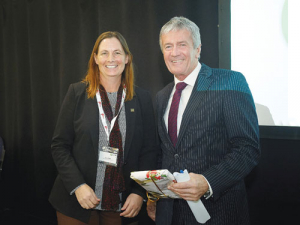Federated Farmers president Katie Milne last month notched up one year in office. She told the recent Feds annual conference in Wellington about issues dominating her first 12 months in the role.
It's been full on and exciting.
But at times some tough decisions have had to be made, none more so than Mycoplasma bovis.
It’s fair to say that farmers were pretty much split down the middle on whether we’d be better off pushing for eradication or going for controlled management. The scientists and experts in the technical advisory group were split six for/four against, but that majority gave us the better odds.
What swayed it in the end was the Prime Minister telling the packed media conference last month, “We have one shot to try to knock M.bovis on the head. I for one – and I’m sure most in this room are the same – don’t want to get two or three years down the track and look back and say, ‘you know what, we might have been able to kill off this disease if we’d been bold about it’. ”
You don’t know unless you have a go at these things.
I always knew the president’s role involved a lot of travel and speaking engagements but I’ve been surprised at the level of it. It’s not just farming groups who want me to speak, but everyone from accountants to hotel and hospitality organisations.
The media stuff has been full-on too; and not just farming publications but mainstream media too – including The Listener and Mind Food magazine.
Interviews with reporters aren’t my favourite thing but as an organisation we need to grab all the chances we get to put our messages across, especially when we can chip away at that urban-rural disconnect.
I consider it a privilege to represent farmers -- who are foodies as well as food growers -- to wider audiences and I know plenty of you provincial presidents take those opportunities as well.
We farmers know the issues and all the ‘good news’ stories because when we’re on social media we click the farming buttons, and we get all those farming publications through our letterbox – though they’re a dwindling number of publications, more’s the pity. Town folk don’t get that same media diet.
So when a reporter wants to talk to me or someone else in Feds we shouldn’t shy away from the chance to reach out and introduce some of the realities of farming into the consciousness of those 84% of Kiwis who live in urban areas, some of them more than three generations [distant] from living on the land.
What about some of the challenges on our horizon?
You’d have to be living under a rock to be bypassed by all the talk about global warming and climate change. But while the world considers moving toward carbon net neutrality, and our own government considers how and whether to get agriculture biological emissions embedded in that process, let’s not forget there was another international agreement forged not long before the Paris Agreement.
Goal No 2 of 17 under the 2030 Agenda for Sustainable Development is ‘Zero Hunger’. These 17 development goals were signed by 193 countries at the United Nations in New York in September 2015.
More than seven billion people already walk planet Earth. It’s predicted that by 2050, 9.7 billion of us will inhabit the planet and to adequately feed everyone, food production will have to rise by 50% – from less water.
So equally important as climate change is ‘how will we produce enough nutritious food to support this population? Particularly as it is predicted that sprawling cities will concrete over valuable soils and climate volatility will change the growing profiles of the districts we farm.
New Zealand can’t feed the world but we can and do feed many more people than live on our shores. As well as the nearly five million Kiwis and tourists here at any one time, it’s estimated that farmers here can produce enough food to feed another 35 million people. Our climate has an impact on that ability; it has been a challenge for all life since life on Earth began.
Climate change does not care if you believe in it; it is not Santa Claus or the Tooth Fairy. It does not need your permission to exist.
As you all know, climate change policy development has been a huge challenge for Federated Farmers, and it continues to be. We are working as closely as we can with the government, legislators, fellow industry bodies and other agencies to make sure the discussions are robust and all-encompassing.
You will hear us talking about treating gases separately, that methane emissions have increased by 4% since 1990. In that same time, road transport emissions have increased by 78%. In reducing carbon dioxide, transport is a big-ticket item that we all can work on.
While a lot of promising work is being done on methane emissions there is still no ‘magic bullet’ to solve the problem of mammals -- especially ruminants – producing it. The fact that it does not add to warming if the number of animals does not go up needs to be part of the discussion, along with the efficiency of animal production here versus other less-efficient production and, therefore, efficient, secure food production.


















